Turning Point
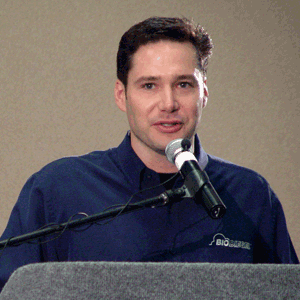


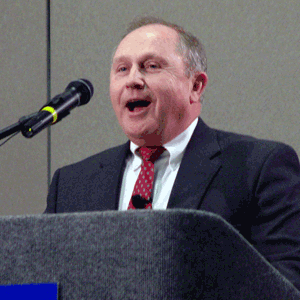
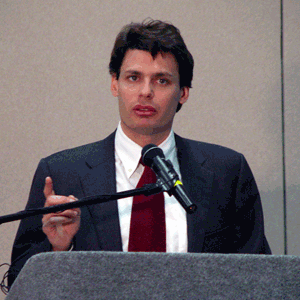
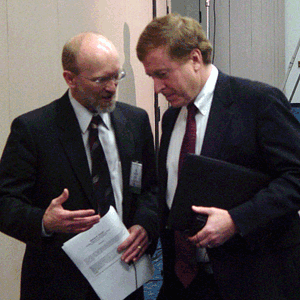
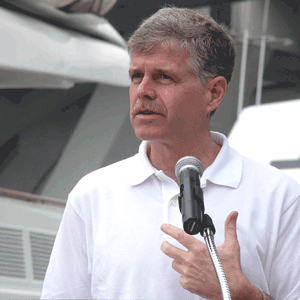


March 1, 2005
BY Dave Nilles
If the U.S. biodiesel industry is truly in its infancy, finding a venue large enough to hold the National Biodiesel Conference & Expo in the years ahead could become an appreciated challenge for the National Biodiesel Board (NBB). More than 1,000 people attended the association's second annual event, nearly doubling the attendance number from 2004.
Does this wave of new interest in biodiesel indicate that the young industry could be at a major turning point-a pivotal moment in its history? NBB Executive Director Joe Jobe stated so in no uncertain terms. "2004 was a turning point for the American biodiesel industry," he said. "2004 became the year that the American biodiesel industry realized that we're not just a silly little experiment in energy. We're a real fuel. We're a real industry. We're here to stay and we are going to make a very significant contribution to America's energy supply."
That turning point was evident not only by the record attendance Jan. 30-Feb. 2 at the Greater Fort Lauderdale/Broward County Convention Center in Ft. Lauderdale, Fla., but by the overwhelming support for the industry expressed by vehicle manufacturers, politicians and health officials.
Support came from individuals like Bailus Walker, past president of the American Lung Association of the District of Columbia and one of the nation's top health officials, who said biodiesel use should be seriously considered in areas with air quality issues. Walker reviewed biodiesel health research prior to approving the D.C. Lung Association's launch of a biodiesel education program in conjunction with the NBB. "What we do here today and how well we move forward with biodiesel … will be judged on how effective this product is in improving air quality, and preventing disease and dysfunction and premature death," Walker said.
There is less than 30 mmgy of biodiesel being produced right now in the United States. Scientists are still validating the effects of burning the renewable fuel. Producers are enhancing the production process with new and innovative technology. The industry still has its challenges, mainly establishing a market and finding suitable feedstocks and potential markets for glycerin. "I think every industry has a point where it struggles along for a certain amount of time and then it begins to get traction-it builds momentum and then it reaches a critical mass and just really establishes itself as a true effort," Jobe said.
It's clear biodiesel is doing just that. The U.S. government is beginning to realize what impact the biodiesel industry can provide. The JOBS bill, passed in October 2004, was a major step in embracing the fuel. It may be the first of many.
"People say the [biodiesel] industry shouldn't be subsidized," said Congresswoman Marcy Kaptur, D-Ohio. "They seem to forget, according to the accounting office, that the United States has spent over $130 billion over the last three decades in subsidies to the oil industry … Even as we sit here today, we hear more for coal, oil and nuclear energy in the energy bill than for biofuels."
Kaptur said that petroleum imports into the United States have nearly tripled since 1983. If the past year is any indication, North American biodiesel production could be in for a similar ride.
"Growth has come in all different quarters-fuel producers, fuel marketers, renderers and recycling people, support industries, other feedstocks and … consumers that are talking about the benefits of biodiesel," said Darryl Brinkman, NBB chairman. "We can bring biodiesel to the forefront for our energy independence."
'Nothing runs like a Deere … with biodiesel.'
While John Deere's famous slogan, "Nothing runs like a Deere," isn't changing, the contents of the equipment manufacturer's fuel tanks is. The company announced that starting March 1, it would begin filling the fuel tanks of vehicles constructed at John Deere's factories in Waterloo, Iowa, and East Moline, Ill., with B2. The company will start the factory fill with tractors and combines before moving into construction equipment, said Don Borgman, manager of market planning and customer integration at the John Deere Ag Marketing Center.
John Deere isn't the only major agriculture equipment manufacturer accepting biodiesel use. Case IH approved the use of blends up to B5 in its line of tractors in 2004.
Borgman said that John Deere has been working with NBB in an attempt to promote B2 on a broad basis, including all diesel engines and home heating oils. He said the B2 decision was boosted by the tax credit passed in the JOBS bill.
"The tax credit helped," Borgman said. "It made this a lot more viable. But we have had an interest in biodiesel for quite some time."
Ed Hegland of the Minnesota Soybean Research & Promotion Council said, "John Deere did not get on the bandwagon … it backed up to the wagon and started pulling it. They are setting a new standard."
Regional sources-such as those on the East Coast-would supply biodiesel, Borgman said. He said John Deere would prefer to purchase fuel from a BQ-9000 accredited producer, but only if it is readily procurable.
John Deere has also done extensive testing on B5. Borgman said the decision to use B2 doesn't back off the company's commitment to B5. He said it's the first step to the use of higher blends.
Liberty and biodiesel for all
"DaimlerChrysler's strategy is fairly simple and straightforward," said Bill Craven, manager of regulatory and technical affairs for DaimlerChrysler Corp. "It's fuel efficiency-in terms of our engines, our vehicles and the fuels we choose."
Craven said DaimlerChrysler has a multi-pronged strategic plan. First, the automaker is trying to make small steps in fuel efficiency. Second, it is implementing new diesel technology, as has been done in Europe, which would open doors for biodiesel. Third, it is actively implementing a hybrid vehicle program launch.
The automaker has an aggressive alternative and renewable fuels strategy that rounds off its strategic approach. Craven said DaimlerChrysler views U.S. diesel market growth, especially in the light-duty vehicle sector, as a major new opportunity. "If we had the same diesel market share in this country as we have in Europe, we would save over 800 million gallons of oil a year … just by changing the engine and utilizing the existing fuel out there."
Craven believes building such a market in the United States is possible. "But the real question is, 'will customers accept diesel engines in light duty vehicles?'" he said. "[Diesel engines] have a bad reputation. We need a reeducation of the public. This test with Jeep Liberty is truly a test … to get through to the people."
DaimlerChrysler is factory filling its diesel-powered Jeep Liberty CRD with B5. The plant is located in Toledo, Ohio. Kaptur, a longtime advocate of biodiesel, championed the automaker's announcement of the factory fill. "The opportunity that is staring us right in the face is not seen by the majority of American people," Kaptur said. She predicted the biofuels industry in America would be the first new growth industry that will move the nation toward economic independence.
Craven said the automaker is conducting a study on B20, and as long as the company is assured that fuel quality standards are implemented and met, DaimlerChrysler will continue to examine the possibility of using higher biodiesel blends in its vehicles. In fact, the idea of getting B20 approved for a factory fill in both the Jeep Liberty CRD and diesel Dodge Ram pickups is gaining momentum, although Craven was unable to confirm the automaker's future plans.
Also, Mercedes Benz, part of the DaimlerChrysler umbrella, is waiting on the approval of injector manufacturer Robert Bosch GmbH to approve B20 in certain diesel models. Craven said a "very rigorous review process" is underway. "We are fairly confident that they will come through and suggest that B20 can be used," he said.
In Germany, DaimlerChrysler has invested in technology that produces biodiesel by converting biomass into a synthetic gas through the Fischer Tropsch process. "For biodiesel from virgin soybean oil, for every unit of energy you put into it, you get 3.2 units back," he said. "The process that we are invested in in Germany … our estimates are about 10 to 1, with energy out versus energy in."
TransMontaigne adds B100
Colorado-based petroleum supply chain management company TransMontaigne will be integrating biodiesel blends into its fuels at one of its south Florida terminals. Rick Eaton, executive vice president of supply chain services for TransMontaigne Product Services, made the announcement.
"We're very optimistic about biodiesel, but we also wanted to be very realistic about the development, intergration costs, capital costs and the overall economic viability," Eaton said.
TransMontaigne is integrating B100 supplied by Peter Cremer North America LP into its 2,200-acre Port Everglades Coastal Fuels terminal. Eaton said the Port Everglades terminal is south Florida's largest distribution center for petroleum products and covers a 12-county area.
The terminal will have rack-blending capabilities, allowing TransMontaigne to offer a variety of blends ranging from B1 to B100. The project, which should be completed in April, involves revamping the facility and adding B100 storage space.
In addition to offering biodiesel to the general marine segment in south Florida, TransMontaigne plans to use biodiesel blends in its own tug and barge operations.
Finding feedstocks and a market for glycerin
Legislation aside, project developers are asking two important questions about the growing number of proposed biodiesel projects in the
United States: What is the feedstock availability, and what markets are there for glycerin?
For answers to those questions, producers in the United States can learn a lesson from their more seasoned counterparts in Europe. According to Raffaelo Garofalo, secretary general of the European Biodiesel Board, the biodiesel producers in the European Union are already looking for international markets for glycerin. The EU currently has 25 producing member-nations.
Even with the limited amount of biodiesel being produced in the United States, the glycerin market is becoming saturated. Biodiesel producers consisted of 11 percent of the glycerin sources in the United States in 2001. That number has certainly increased in the past four years.
New markets for refined glycerin are needed and it's possible that government intervention may be needed to boost those markets, according to Mack Findley, North American sales manager for Peter Cremer. Findley predicted that de-icing fluids might hold a strong future using glycerin. He also suggested a proposal to Congress to direct biodiesel glycerin to non-traditional markets such as animal feed.
Findley warned against using the current market price for glycerin when considering building a biodiesel plant. Glycerin prices have dropped sharply in the past 10 years.
Feedstocks are another concern. Garofalo said oilseed production in Europe isn't expected to increase much in the long term, and plans to boost energy crop production haven't been effective.
John Campbell, vice president of Ag Processing Inc., estimates that the domestic supply of economically available raw material could produce between 130 mmgy and 260 mmgy of biodiesel in the near term. His long-range estimates, taking into account the availability of soybean acres, soybean oil content and increased domestic soybean crush amount, among other issues, could reach nearly 4 billion gallons per year. That amount is approximately 10 percent of transportation diesel fuel use in the United States.
Campbell's estimates didn't take into account yellow grease or palm oil imports.
Michael Haas, a research chemist for the Fats, Oils and Animal Coproducts Research Unit at the Eastern Regional Research Center, has conducted research on biodiesel production through soy flakes using in situ transesterification. Soy flake methyl esters met or exceeded ASTM standards in the study; however, production costs were an issue.
Haas also noted the susceptibility of other lipid-bearing materials to in situ transesterification. Preliminary results showed that distillers grains with solubles (DDGS) contained 12 percent oil with 71 percent conversion to fatty acid methyl esters. The process is, in effect, producing biodiesel from corn oil. Haas said biodiesel facilities could benefit from locating near ethanol plants. He said about 200 mmgy of biodiesel could be produced from the current DDGS amounts in the United States.
"This offers the potential feedstock windows we've never considered before," Haas said.
Racing around the world on B100
A former oil exploration engineer is aiming to break a world record with the help of biodiesel. Pete Bethune is attempting to break the world speed record for circumnavigation of the globe with a powerboat. The current record is 75 days. Bethune's goal is 60 days. "The most important thing is that the fuel will be B100," Bethune said.
Bethune's project, EarthRace, will feature a wave-piercing boat fabricated mostly of carbon and Kevlar, that will cover more than 24,000 nautical miles around the globe. Bethune said the boat is the first to be powered by carbon drive shafts. The boat is considered a wave-piercer, meaning it travels through larger waves instead of over the top of them. "Visually, it's a very stimulating project," Bethune said. "And we are hoping to transfer part of that imagery onto biodiesel."
Biodiesel Magazine featured another circumnavigation voyage in its February issue. The Sunrider expedition circled the globe on B100 in 1994 in a 24-foot, soft-sided Zodiac boat.
EarthRace has taken three years to reach its culmination. Construction on Bethune's boat began in January. He expects to be water-ready by July. A promotional tour will cover North America and Bethune is asking for sponsorship to fund the project or the biodiesel itself. "We can't do this alone," he said. "We've committed our life savings to it. ... It would be great to get some support from people."
More information about the project can be found online at www.earthrace.net. n
Dave Nilles is a Biodiesel Magazine staff writer. Reach him by e-mail at dnilles@bbibiofuels.com or by phone at (701) 746-8385.
Does this wave of new interest in biodiesel indicate that the young industry could be at a major turning point-a pivotal moment in its history? NBB Executive Director Joe Jobe stated so in no uncertain terms. "2004 was a turning point for the American biodiesel industry," he said. "2004 became the year that the American biodiesel industry realized that we're not just a silly little experiment in energy. We're a real fuel. We're a real industry. We're here to stay and we are going to make a very significant contribution to America's energy supply."
That turning point was evident not only by the record attendance Jan. 30-Feb. 2 at the Greater Fort Lauderdale/Broward County Convention Center in Ft. Lauderdale, Fla., but by the overwhelming support for the industry expressed by vehicle manufacturers, politicians and health officials.
Support came from individuals like Bailus Walker, past president of the American Lung Association of the District of Columbia and one of the nation's top health officials, who said biodiesel use should be seriously considered in areas with air quality issues. Walker reviewed biodiesel health research prior to approving the D.C. Lung Association's launch of a biodiesel education program in conjunction with the NBB. "What we do here today and how well we move forward with biodiesel … will be judged on how effective this product is in improving air quality, and preventing disease and dysfunction and premature death," Walker said.
There is less than 30 mmgy of biodiesel being produced right now in the United States. Scientists are still validating the effects of burning the renewable fuel. Producers are enhancing the production process with new and innovative technology. The industry still has its challenges, mainly establishing a market and finding suitable feedstocks and potential markets for glycerin. "I think every industry has a point where it struggles along for a certain amount of time and then it begins to get traction-it builds momentum and then it reaches a critical mass and just really establishes itself as a true effort," Jobe said.
It's clear biodiesel is doing just that. The U.S. government is beginning to realize what impact the biodiesel industry can provide. The JOBS bill, passed in October 2004, was a major step in embracing the fuel. It may be the first of many.
"People say the [biodiesel] industry shouldn't be subsidized," said Congresswoman Marcy Kaptur, D-Ohio. "They seem to forget, according to the accounting office, that the United States has spent over $130 billion over the last three decades in subsidies to the oil industry … Even as we sit here today, we hear more for coal, oil and nuclear energy in the energy bill than for biofuels."
Kaptur said that petroleum imports into the United States have nearly tripled since 1983. If the past year is any indication, North American biodiesel production could be in for a similar ride.
"Growth has come in all different quarters-fuel producers, fuel marketers, renderers and recycling people, support industries, other feedstocks and … consumers that are talking about the benefits of biodiesel," said Darryl Brinkman, NBB chairman. "We can bring biodiesel to the forefront for our energy independence."
'Nothing runs like a Deere … with biodiesel.'
While John Deere's famous slogan, "Nothing runs like a Deere," isn't changing, the contents of the equipment manufacturer's fuel tanks is. The company announced that starting March 1, it would begin filling the fuel tanks of vehicles constructed at John Deere's factories in Waterloo, Iowa, and East Moline, Ill., with B2. The company will start the factory fill with tractors and combines before moving into construction equipment, said Don Borgman, manager of market planning and customer integration at the John Deere Ag Marketing Center.
John Deere isn't the only major agriculture equipment manufacturer accepting biodiesel use. Case IH approved the use of blends up to B5 in its line of tractors in 2004.
Borgman said that John Deere has been working with NBB in an attempt to promote B2 on a broad basis, including all diesel engines and home heating oils. He said the B2 decision was boosted by the tax credit passed in the JOBS bill.
"The tax credit helped," Borgman said. "It made this a lot more viable. But we have had an interest in biodiesel for quite some time."
Ed Hegland of the Minnesota Soybean Research & Promotion Council said, "John Deere did not get on the bandwagon … it backed up to the wagon and started pulling it. They are setting a new standard."
Regional sources-such as those on the East Coast-would supply biodiesel, Borgman said. He said John Deere would prefer to purchase fuel from a BQ-9000 accredited producer, but only if it is readily procurable.
John Deere has also done extensive testing on B5. Borgman said the decision to use B2 doesn't back off the company's commitment to B5. He said it's the first step to the use of higher blends.
Liberty and biodiesel for all
"DaimlerChrysler's strategy is fairly simple and straightforward," said Bill Craven, manager of regulatory and technical affairs for DaimlerChrysler Corp. "It's fuel efficiency-in terms of our engines, our vehicles and the fuels we choose."
Craven said DaimlerChrysler has a multi-pronged strategic plan. First, the automaker is trying to make small steps in fuel efficiency. Second, it is implementing new diesel technology, as has been done in Europe, which would open doors for biodiesel. Third, it is actively implementing a hybrid vehicle program launch.
The automaker has an aggressive alternative and renewable fuels strategy that rounds off its strategic approach. Craven said DaimlerChrysler views U.S. diesel market growth, especially in the light-duty vehicle sector, as a major new opportunity. "If we had the same diesel market share in this country as we have in Europe, we would save over 800 million gallons of oil a year … just by changing the engine and utilizing the existing fuel out there."
Craven believes building such a market in the United States is possible. "But the real question is, 'will customers accept diesel engines in light duty vehicles?'" he said. "[Diesel engines] have a bad reputation. We need a reeducation of the public. This test with Jeep Liberty is truly a test … to get through to the people."
DaimlerChrysler is factory filling its diesel-powered Jeep Liberty CRD with B5. The plant is located in Toledo, Ohio. Kaptur, a longtime advocate of biodiesel, championed the automaker's announcement of the factory fill. "The opportunity that is staring us right in the face is not seen by the majority of American people," Kaptur said. She predicted the biofuels industry in America would be the first new growth industry that will move the nation toward economic independence.
Craven said the automaker is conducting a study on B20, and as long as the company is assured that fuel quality standards are implemented and met, DaimlerChrysler will continue to examine the possibility of using higher biodiesel blends in its vehicles. In fact, the idea of getting B20 approved for a factory fill in both the Jeep Liberty CRD and diesel Dodge Ram pickups is gaining momentum, although Craven was unable to confirm the automaker's future plans.
Also, Mercedes Benz, part of the DaimlerChrysler umbrella, is waiting on the approval of injector manufacturer Robert Bosch GmbH to approve B20 in certain diesel models. Craven said a "very rigorous review process" is underway. "We are fairly confident that they will come through and suggest that B20 can be used," he said.
In Germany, DaimlerChrysler has invested in technology that produces biodiesel by converting biomass into a synthetic gas through the Fischer Tropsch process. "For biodiesel from virgin soybean oil, for every unit of energy you put into it, you get 3.2 units back," he said. "The process that we are invested in in Germany … our estimates are about 10 to 1, with energy out versus energy in."
TransMontaigne adds B100
Colorado-based petroleum supply chain management company TransMontaigne will be integrating biodiesel blends into its fuels at one of its south Florida terminals. Rick Eaton, executive vice president of supply chain services for TransMontaigne Product Services, made the announcement.
"We're very optimistic about biodiesel, but we also wanted to be very realistic about the development, intergration costs, capital costs and the overall economic viability," Eaton said.
TransMontaigne is integrating B100 supplied by Peter Cremer North America LP into its 2,200-acre Port Everglades Coastal Fuels terminal. Eaton said the Port Everglades terminal is south Florida's largest distribution center for petroleum products and covers a 12-county area.
The terminal will have rack-blending capabilities, allowing TransMontaigne to offer a variety of blends ranging from B1 to B100. The project, which should be completed in April, involves revamping the facility and adding B100 storage space.
In addition to offering biodiesel to the general marine segment in south Florida, TransMontaigne plans to use biodiesel blends in its own tug and barge operations.
Finding feedstocks and a market for glycerin
Legislation aside, project developers are asking two important questions about the growing number of proposed biodiesel projects in the
United States: What is the feedstock availability, and what markets are there for glycerin?
For answers to those questions, producers in the United States can learn a lesson from their more seasoned counterparts in Europe. According to Raffaelo Garofalo, secretary general of the European Biodiesel Board, the biodiesel producers in the European Union are already looking for international markets for glycerin. The EU currently has 25 producing member-nations.
Even with the limited amount of biodiesel being produced in the United States, the glycerin market is becoming saturated. Biodiesel producers consisted of 11 percent of the glycerin sources in the United States in 2001. That number has certainly increased in the past four years.
New markets for refined glycerin are needed and it's possible that government intervention may be needed to boost those markets, according to Mack Findley, North American sales manager for Peter Cremer. Findley predicted that de-icing fluids might hold a strong future using glycerin. He also suggested a proposal to Congress to direct biodiesel glycerin to non-traditional markets such as animal feed.
Findley warned against using the current market price for glycerin when considering building a biodiesel plant. Glycerin prices have dropped sharply in the past 10 years.
Feedstocks are another concern. Garofalo said oilseed production in Europe isn't expected to increase much in the long term, and plans to boost energy crop production haven't been effective.
John Campbell, vice president of Ag Processing Inc., estimates that the domestic supply of economically available raw material could produce between 130 mmgy and 260 mmgy of biodiesel in the near term. His long-range estimates, taking into account the availability of soybean acres, soybean oil content and increased domestic soybean crush amount, among other issues, could reach nearly 4 billion gallons per year. That amount is approximately 10 percent of transportation diesel fuel use in the United States.
Campbell's estimates didn't take into account yellow grease or palm oil imports.
Michael Haas, a research chemist for the Fats, Oils and Animal Coproducts Research Unit at the Eastern Regional Research Center, has conducted research on biodiesel production through soy flakes using in situ transesterification. Soy flake methyl esters met or exceeded ASTM standards in the study; however, production costs were an issue.
Haas also noted the susceptibility of other lipid-bearing materials to in situ transesterification. Preliminary results showed that distillers grains with solubles (DDGS) contained 12 percent oil with 71 percent conversion to fatty acid methyl esters. The process is, in effect, producing biodiesel from corn oil. Haas said biodiesel facilities could benefit from locating near ethanol plants. He said about 200 mmgy of biodiesel could be produced from the current DDGS amounts in the United States.
"This offers the potential feedstock windows we've never considered before," Haas said.
Racing around the world on B100
A former oil exploration engineer is aiming to break a world record with the help of biodiesel. Pete Bethune is attempting to break the world speed record for circumnavigation of the globe with a powerboat. The current record is 75 days. Bethune's goal is 60 days. "The most important thing is that the fuel will be B100," Bethune said.
Bethune's project, EarthRace, will feature a wave-piercing boat fabricated mostly of carbon and Kevlar, that will cover more than 24,000 nautical miles around the globe. Bethune said the boat is the first to be powered by carbon drive shafts. The boat is considered a wave-piercer, meaning it travels through larger waves instead of over the top of them. "Visually, it's a very stimulating project," Bethune said. "And we are hoping to transfer part of that imagery onto biodiesel."
Biodiesel Magazine featured another circumnavigation voyage in its February issue. The Sunrider expedition circled the globe on B100 in 1994 in a 24-foot, soft-sided Zodiac boat.
EarthRace has taken three years to reach its culmination. Construction on Bethune's boat began in January. He expects to be water-ready by July. A promotional tour will cover North America and Bethune is asking for sponsorship to fund the project or the biodiesel itself. "We can't do this alone," he said. "We've committed our life savings to it. ... It would be great to get some support from people."
More information about the project can be found online at www.earthrace.net. n
Dave Nilles is a Biodiesel Magazine staff writer. Reach him by e-mail at dnilles@bbibiofuels.com or by phone at (701) 746-8385.
Advertisement
Advertisement
Advertisement
Advertisement
Upcoming Events





